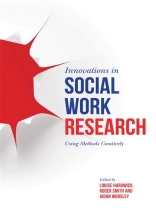A valuable reference to help practising researchers not only to understand but also to apply innovative approaches to social work research.
Featuring extended case studies of actual research projects, the book provides an overview of a number of central features and qualities of social work research. It incorporates both distinctive methodological features, such as approaches to participatory inquiry, and provides accounts of researcher strategies to address particular challenges, such as carrying out studies with hard to reach populations. This book combines important methodological insights with pragmatic guidance on commonly experienced problems and how these challenges can be overcome.
This is a key resource for social work and social care students, social work practitioners and academics engaged in research.
Jadual kandungan
About the Editors and Contributors. Acknowledgements. Introduction. Section 1: Innovations in Design and Planning. 1. Action Research for Social Justice: Researching and Organising on Household Debt, Sarah Banks, Durham University. 2. A Randomised Controlled Trial of a Therapeutic Intervention for Children Affected by Sexual Abuse, Tricia Jessiman, John Carpenter and Trish O’Donnell, University of Bristol. 3. Front Row Seats: Why Researchers Need to Get Closer to Practice and How We Can Do So, David Westlake, University of Bedfordshire. 4. Archival Resources for Social Work History, Pat Starkey, University of Liverpool. 5. A Study of Long Term Outcomes of Children with Harmful Sexual Behaviour: Using Social Media to Reach and Engage a ‘Hard to Reach’ Population, Simon Hackett, Durham University with Myles Balfe, University College Cork, Helen Masson, University of Huddersfield and Josie Phillips, Durham University. 6. Involving People with Dementia in a Systemic Review, Nicolette Wade and Mike Fisher, University of Bedfordshire. 7. Acting as a Critical Friend – Developmental Evaluations, Service Users and the Role of the Researcher, Roger Smith, Durham University. Section 2: Innovations in Research Methods. 8. Observing Social Work Practice:Using Ethnographic and Mobile Research Methods with social workers and service users, Harry Ferguson, University of Nottingham. 9. Using Mobile Methods to Explore the Lives of Marginalised Young Men in Manchester, Alistair Roy, Jenny Hughes, Lynn Frogett and Jennifer Christensen, University of Central Lancashire. 10. Being Brave, Doing Creative: Using Visual Ethnography in Social Work Research to Explore the Impact of Space and Environment on Organisational Culture, Jadwiga Leigh, University of Sheffield. 11. Researching Recovery from Substance Misuse Using Visual Methods, Julian Manley, Alistair Roy and Lyn Frogett, University of Central Lancashire. Section 3: Innovations in Data Analysis. 12. Validating Meaning Making: The Potential of Phenomenological Inquiry, Sue Thompson, Avenue Media Solutions. 13. The Elephant in the Room, Bogusia Temple, University of Central Lancashire. 14. Data Analysis in Participatory Research with Adults with Asperger’s Syndrome, Jackie Robinson, De Montfort University. 15. Quantitative Research and the Secondary Analysis of Longitude Data in Social Work Research, Martin Elliot, Cardiff University. Section 4: Innovations in Dissemination and Impact. 16. Participatory Action Research: Empowering Women to Evaluate Services, Lena Dominelli, Durham University. 17. ‘A Little Bit of What I’m About’: Urban Photography For Social Work Research, Natalie Robinson, University of Liverpool. 18. Incorporating ‘Knowledge Exchange’ Into Research Design and Dissemination Strategies, Aisha Hutchinson and Cherilyn Dance, University of Bedfordshire. 19. You’re Not in The Picture: Service Users, Research, Involvement and Change, Jennifer Taylor, Gina Barrett, Vic Forrest, People First Lambeth, Shaping Our Lives, Peter Beresford, Brunel University, Becki Meakin, People First Lambeth, Shaping Our Lives. Conclusion.
Mengenai Pengarang
David Westlake is Research Fellow, Tilda Goldberg Centre for Social Work and Social Care, University of Bedfordshire, UK.












